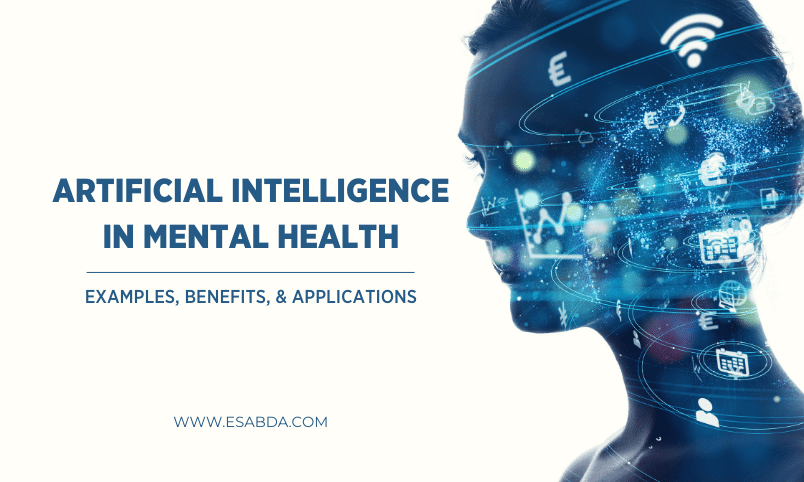By Esabda
In recent years, artificial intelligence (AI) is the biggest hot topic for good reasons. We all know how many people use artificial intelligence in their daily life. AI is being used in various fields, from assisting with homework to helping write business letters. Like any other field, Artificial Intelligence is becoming very crucial in the field of mental health. In this article we will explore the roles, benefits, applications, and examples of artificial intelligence in mental health.
What is Artificial Intelligence and Mental Health
To better understand how Artificial Intelligence is being used in mental health, it’s important to have a basic understanding of what AI is. At its core, AI refers to the ability of machines to learn and make decisions like humans. It involves the development of algorithms and computer programs that can analyze and process data to make predictions or decisions. Machine learning and natural language processing are two common types of AI.
In simple words, we can understand AI as our day-to-day friend that helps in our regular activities. Artificial intelligence (AI) is a type of technology that allows computers to perform tasks that would typically require human intelligence, such as recognizing patterns, making decisions, and learning from experience.
Also, mental health refers to a person’s overall emotional and psychological well-being. It includes how we feel about ourselves, how we manage our emotions, how we handle stress, and how we interact with others. In the US, more than 20% of adults experienced mental illness in 2019-2020. This is equivalent to the 50 million people of the total population of America. This is a very huge number of mentally ill people who require proper mental healthcare.
Artificial Intelligence (AI) In Mental Health
Artificial Intelligence (AI) has emerged as a promising tool in the field of mental health. We can use AI to analyze large amounts of data and detect patterns that human experts may not be able to identify. It can also provide personalized treatment recommendations based on an individual’s unique needs and circumstances.

AI-powered chatbots and virtual assistants can be used to provide immediate support and guidance to people experiencing mental health issues. To avoid potential harm to vulnerable groups, it is crucial to make sure that the use of AI in mental health is closely controlled and that ethical considerations are taken into account.
Applications Of Artificial Intelligence (AI) in Mental Health
There are various roles that an AI can play in the field of mental health. Artificial Intelligence has already being used in various healthcare field like Psychology, Eyecare, Radiology, and many more. Currently, researchers and mental health professionals are using AI in several ways within the field of mental health.
Chatbots and Virtual Assistants
One of the most common applications is in chatbots and virtual assistants. These tools can interact with individuals to provide support and resources for mental health issues. We can use chatbots to screen for mental health conditions and direct individuals to appropriate resources. Which later can be helpful for better diagnosis.
Analysis of Large Datasets
Another application of AI in mental health is in the analysis of large datasets. Researchers can use AI algorithms to analyze data from electronic health records, social media, and other sources to identify patterns and risk factors for mental health conditions. For those who are at risk for mental health problems, this information can be used to create treatments that are more focused and successful.
Develop Predictive Models
AI is also being used to develop predictive models for mental health conditions. By analyzing data from individuals with mental health conditions, AI algorithms can identify patterns and risk factors that may predict the development of mental health issues in others. This information can be used to develop personalized treatment and preventative measures.
Early Intervention
AI algorithms can analyze patterns of behavior and identify early warning signs of mental health conditions, allowing for early intervention and treatment before symptoms worsen. This can help to prevent more severe mental health problems from developing and improve long-term outcomes for individuals.
Digital Therapeutics
AI-powered digital therapeutics can provide support for individuals with mental health conditions outside of traditional therapy sessions. These tools can include smartphone apps that provide mindfulness exercises, cognitive-behavioral therapy, and other interventions. This can help to improve self-management of mental health conditions and provide additional support to patients.
Examples Of Artificial Intelligence (AI) In Mental Health
There are numerous examples of how the field of mental health uses artificial intelligence (AI) to improve patient outcomes and provide better care
1. Woebot
Woebot is an AI-powered chatbot that provides cognitive-behavioral therapy to individuals with depression and anxiety. This platform engages in natural language conversations with patients and helps you to get back to your normal mental status. The application of Webot is available in both Google Play, and App Store.
2. BrainCheck
BrainCheck is an AI-powered app that provides cognitive assessments to individuals with mental health conditions. More than 400 Neurology, Geriatrics Practices, and Primary Care use it. The app uses games and exercises to assess cognitive function and provide personalized feedback to patients and mental health professionals. The application of BrainCheck is available on App Store.
3. Talkspace
Talkspace is an AI-powered therapy platform that provides online therapy to individuals with mental health conditions. The platform uses AI algorithms to match patients with licensed therapists based on their individual needs. This platform also uses AI to track it’s therapists performance over time. The application of Talkspace is available in both Google Play, and App Store.
Future of Artificial Intelligence in Mental Health
Despite of few drawbacks like potential for bias in AI algorithm, and sharing sensitive information with machines rather than human professionals. Artificial Intelligence in Mental health is likely to grow so much in future coming years.
There is a huge demand for the mental health services and shortage for mental health professionals. According to the research of Mental Health America (MHA) research, there are estimation of 350 people for every mental health professional in the United States. This is when AI implemented tools like chatbots, and virtual assistants can provide essentials resources and services to the mental health patients.
Additionally, as AI algorithms advance, they might become better at identifying and diagnosing mental health disorders, which would enable more efficient treatment and better results.
Also Read: Artificial Intelligence In Psychology | Applications And Trend
In Conclusion
In conclusion, the use of AI in mental health has the potential to revolutionize the field and improve access to care, accuracy of diagnoses, and personalized treatment options. However, there are also potential drawbacks to consider, such as the potential for bias and privacy violations. As the field of AI continues to evolve, it will be important to carefully consider the ethical implications of its use in mental health and ensure that it is used in a way that benefits individuals while minimizing potential harm.
If someone you know is mentally ill, then understanding the basic overview of Artificial Intelligence in Mental health can give you so much ideas. Later you can suggest its benefits and AI driven tools that can help someone with bad mental health.
Also Read: Artificial Intelligence in Food Industry | Applications And Trend
FAQs
Mental health professionals should use AI as a tool to augment their work, not replace it.
Ensure that you keep the information secure and do not use it for nefarious purposes.




